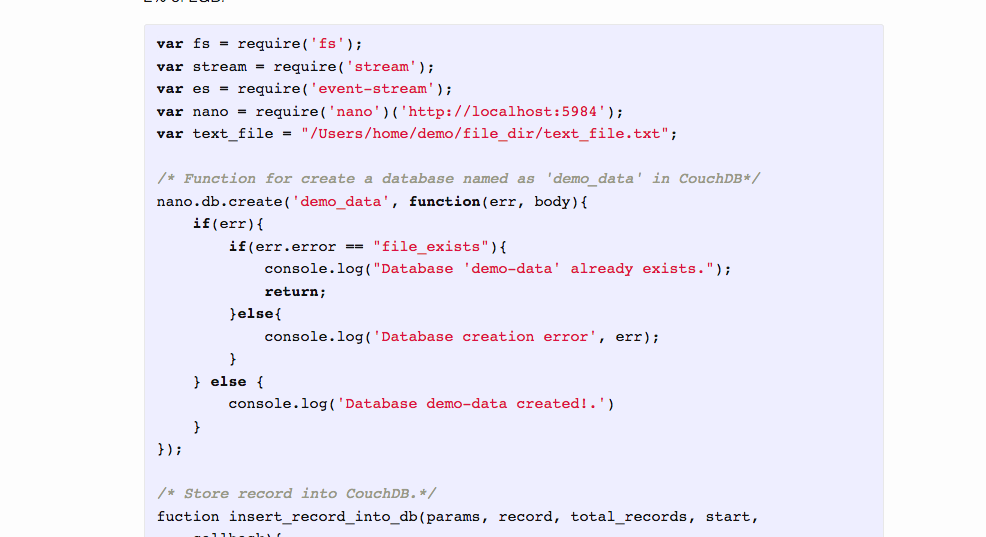1
2
3
4
5
6
7
8
9
10
11
12
13
14
15
16
17
18
19
20
21
22
23
24
25
26
27
28
29
30
31
32
33
34
35
36
37
38
39
40
41
42
43
44
45
46
47
48
49
50
51
52
53
54
55
56
57
58
59
60
61
62
63
64
65
66
67
68
69
70
71
72
73
74
75
76
77
78
79
80
81
82
83
84
85
86
87
88
89
90
91
92
93
94
| var fs = require('fs');
var stream = require('stream');
var es = require('event-stream');
var nano = require('nano')('http://localhost:5984');
var text_file = "/Users/home/demo/file_dir/text_file.txt";
nano.db.create('demo_data', function(err, body){
if(err){
if(err.error == "file_exists"){
console.log("Database 'demo-data' already exists.");
return;
}else{
console.log('Database creation error', err);
}
} else {
console.log('Database demo-data created!.')
}
});
fuction insert_record_into_db(params, record, total_records, start,
callback){
db2.insert(params, function(err, body){
var end = new Date().getTime();
var time = end - start;
if(err) {
console.log('Errror: '+ key, err.message)
callback;
return;
}else{
console.log('You have inserted record: ', key, "record no: " ,
++record, "from Total recodrds", total_records, "Time Elapsed: "
+ time + "mseconds.");
callback;
}
});
}
function read_line_by_line(file, total_records){
var record = 0;
var start = new Date().getTime();
var line_no = 1;
s= fs.createReadStream(file)
.pipe(es.split())
.pipe(es.mapSync(function(line){
s.pause();
line_no += 1;
(function(){
if(line){
var json = JSON.parse(line.slice(line.indexOf("{"),
(line.lastIndexOf("}") + 1)));
var key = json["key"];
var type = json["type"]["key"];
var last_modified = json["last_modified"]["value"];
var revision = json["revision"];
var parms = {_id: key, type: type,
modified_at:last_modified, rev:revision, json:json};
insert_record_into_db(parms, record, total_records, start,
s.resume());
}
})();
}).on('error', function(){
console.log('Error while reading file.');
}).on('end', function(){
console.log("Reading entirefile.");
})
);
}
var total_records = 1
s = fs.createReadStream(text_file)
.pipe(es.split())
.pipe(es.mapSync(function(line){
s.pause();
total_records += 1;
(function(){
s.resume();
})();
})
.on('error', function(){
console.log('Error while reading file.');
})
.on('end', function(){
read_line_by_line("file.txt", total_records)
})
);
|
